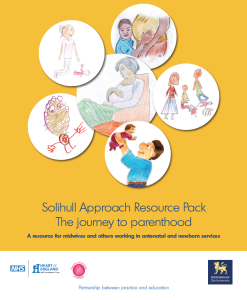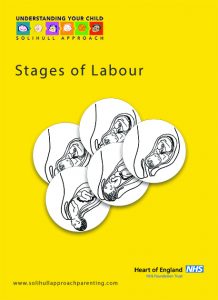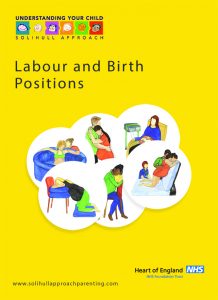Antenatal
Solihull Approach Antenatal Training and Resources
The Solihull Approach is an evidence based and developed in the UK. It is about improving emotional health and wellbeing through relationships from the antenatal period through childhood into adulthood. Whether you work in the community, in a hospital or an acute setting your involvement with a pregnant woman and her family in the antenatal and postnatal period can have a significant impact on how the parent feels about the pregnancy, labour, birth and the first few months with their baby. These early experiences are crucial in building healthy long term relationships.
The Solihull Approach is featured in the DoH Healthy Child Programme, NICE website and is also featured as an example of good practice in the West Midland’s Maternity and Newborn Care Pathway report 2010. The Solihull Approach supports recommendations outlined in Preparing for birth and beyond
The Solihull Approach has developed a range of resources, groups for parents and training for professionals working in the antenatal period through to parenthood (birth to 18 years). The approach is an integrated model and theoretical framework for thinking about your work with women and their families.
The Solihull Approach foundation trainings introduce professionals to the Solihull Approach and how it can be used in their one to one practice with mothers, fathers, partners and families to support their emotional health and wellbeing. The training supports midwives with the early identification of issues around mental health and well-being, which if left unsupported may develop into more serious perinatal mental health difficulties. The Solihull Approach Foundation trainings also provide professionals with an understanding of the Solihull Approach model that can also be applied to group work, if professionals go on to deliver any of the Solihull Approach groups for parents. In the antenatal period the Solihull Approach have designed an Antenatal Parenting Group ‘Understanding pregnancy, labour, birth and your baby’ that weaves together information that mothers, fathers, and partners want to know about pregnancy and birth along with preparation for developing a relationship with the baby in the womb, during the birth and after the baby is born.
Antenatal and Postnatal newsletter. Autumn 2017.
October 2017Solihull Approach Trainings for midwives and other professionals working in the Antenatal and Postnatal Period
The Solihull Approach has created a range of trainings that professionals working with families in the antenatal and postnatal period have found interesting and useful in their work.
These include:
- Solihull Approach 2 day Antenatal foundation training Although the training has a focus on the antenatal period the Solihull Approach theoretical model provides professionals with a framework for thinking about their work with families from conception to 18 years. It can also be adapted to work with adults as well as being used in different work and personal situations. The Foundation training allows access to other Solihull Approach trainings.
- Solihull Approach Antenatal Foundation and Antenatal Parenting Group Facilitator 2 day training For professionals who have not attended a Solihull Approach Foundation training and would also like to run an Antenatal Parenting Group.
- Solihull Approach Antenatal Parenting Group Facilitator 1 day training For professionals who have already attended an Antenatal Foundation 2 day training and would like to run an Antenatal Parenting Group.
The Solihull Approach has also developed trainings for the postnatal period that include:
- Solihull Approach Postnatal Parenting Group Facilitator 1 day training For professionals who have attended a Solihull Approach Foundation training and would like to run either of the Postnatal (universal) or Postnatal Plus groups for parents
- Solihull Approach Peer Breastfeeding Supporter training For professionals who have attended a Solihull Approach Foundation 2 day training and want to train mothers,fathers, partners, friends, family members, volunteers and employed workers as peer breastfeeding supporters.
- Solihull Approach Antenatal Resource Pack – The Journey to Parenthood
Solihull Approach Antenatal Resource Pack – The Journey to Parenthood
 Part 1: Introduction,
Part 1: Introduction,
Part 2: Theoretical model supporting the Solihull Approach,
Part 3: The development of the ‘baby brain’ and the parent–child relationship
Part 4: Preparing for parenthood – contains a range of information on the following topics:
Building relationships and exploring issues about parenthood, Working with parents who have had aided conception, Pregnancy after a previous history of miscarriage or stillbirth, Using the Solihull Approach to work with bereaved families, Fathers’ emotional responses to pregnancy, Pregnancy, labour and the birth experience, When something goes wrong during pregnancy, If the baby is premature, ill or disabled, The social baby, When the baby becomes real, Antenatal and postnatal depression, Fathers and their newborn babies, Working with parents with history of mental health, disability or physical ill health, Separation, Teenagers, Multiple births, Higher risk: older mums, genetic conditions, drugs and alcohol abuse, When a baby is unplanned or unwanted, Feeding, Domestic violence: working with families
Groups for parents
The Solihull Approach has developed groups for parents that include:
Solihull Approach Antenatal Group ‘Understanding your pregnancy, labour, birth and your baby’
The Solihull Approach Antenatal Parenting Group is a 5 sessions (plus an optional 6th session). It can be delivered in Children’s Centres, hospitals, community clinics and other suitable venues. The sessions take place over 2 hours. Facilitators should be trained in the Solihull Approach and there is an Antenatal Parenting Group 1 day facilitator training explaining how to facilitate the group. The training is supported by a detailed Antenatal Group facilitator’s manual.
Ideally the group should be delivered by a Solihull Approach training midwife and child/family practitioner together.
We have designed a selection of resources to support the delivery of the Antenatal Parenting group
NEW Antenatal Resource Bag – Cost £350 (includes p&p)
We have put together an Antenatal Resource Bag to support delivery of the Solihull Approach Antenatal group, so that you have everything in one place in a robust bag for either storage or transporting around. The Resource Bag has in it:
- Stages of Labour Display Chart Set (A3 Laminated)
- Labour and Birth Positions: Spiral binder with illustrations (A4 Laminated)
- Doll
- Pelvis
- Bump to breastfeeding DVD
- Baby tummy sizers
- Baby it’s you DVD
- Knitted breast for demonstration
If you already have some of the resources you can purchase the following items separately
 Stage of Labour Display Chart Set – Cost £49 (includes p&p)
Stage of Labour Display Chart Set – Cost £49 (includes p&p)
This Display Chart Set (A3 Laminated) has 5 drawings showing the Stages of Labour. The Charts support the delivery of the Solihull Approach Antenatal Group ‘Understanding your pregnancy, labour, birth and your baby’.
 Labour and Birth Positions Spiral Binder – Cost £39 (includes p&p)
Labour and Birth Positions Spiral Binder – Cost £39 (includes p&p)
These 10 illustrations (A4 Laminated) in a spiral binder show common positions used in Labour and Birth. These illustrations support the delivery of the Solihull Approach Antenatal group ‘Understanding your pregnancy, labour, birth and your baby’.
Other Antenatal Resources
We also have 3 original Antenatal Resource Bags on Sale (the contents differs from the NEW Antenatal Resource Bag) with a significant discount on sale for £345 each (includes p&p)
Other Groups for Parents
Postnatal Parenting Group for Parents (Universal) ‘Understanding your baby’ -birth to around 9 months
This group is a universal group for all mothers, fathers, partners, grandparents or any other person who has a carer role with the baby. There are 6 sessions of 2 hours each. It focuses on relationships and issues relevant in the first year of life such as communication, crying, developing healthy sleep patterns, separation between the parent and their baby and feeding.
Postnatal Plus Parenting Group for Parents ‘Understanding your baby’ – birth to around 9 months
The Postnatal Plus Parenting Group version of ‘Understanding your baby’ is for mothers and fathers with relationship difficulties with their baby and for mothers with postnatal depression. There are 8 sessions of 2 hours each. It focuses on relationships and approach issues in the first year of life with additional thoughtfulness in relation to the parent child/relationship, such as communication, crying, developing healthy sleep patterns, separation between the parent and their baby and feeding.
Parenting Group for Parents ‘Understanding your child’s behaviour’ – 1 year to 18 years
‘Understanding your child’s behaviour’ group is for all parents, mothers and fathers, of children aged 6 months to 18 years. 10 sessions of 2 hours each. It focuses on relationships. Behaviour management is thought of within the context of the relationship. Photocopiable handouts for parents. No literacy required in the group. Has been run successfully in different cultures, in the UK, Pakistan and Africa. Parents and facilitators enjoy the group. Quantitative and qualitative research published with more on the way.
There are free Addendums available to adapt the group for parents of children with disabilities, parents of children with ASD and for adoptive parents. Contact the Solihull Approach office on 0121 296 4448 or via Contact us. You will need to prove that you are trained to deliver the Parenting group and have a Facilitator’s Manual.
Online Courses for Parents
Antenatal Online Course for Parents ‘Understanding your pregnancy, labour, birth and your baby’ Cost £19 per online course
The Antenatal online course for parents is a 9 module course for mothers, fathers, partners, birth partners or grandparents with information about the pregnancy and birth and preparation for making a relationship with the baby in the womb to birth and after the baby is born. The modules have activities, quizzes and video clips and works on mobiles, tablets, Pcs, Macs, ipads and laptops. The course can be accessed through our website for parents www.inourplace.co.uk
Postnatal Online Course for Parents ‘Understanding your baby’ Cost £21 per online course
The Postnatal online course for parents is an 11 module course for mothers, fathers, partners and other adults involved in the care of the baby. The modules include: Understanding feelings- both the parents and baby’s, the baby’s brain, how to respond to crying, baby’s rhythms, healthy sleep patterns, feeding, play and development, baby childcare and there is also a module for dads.The modules have activities, quizzes and video clips and works on mobiles, tablets, Pcs, Macs, ipads and laptops. The course can be accessed through our website for parents www.inourplace.co.uk
Parenting Online Course for Parents ‘Understanding your child’ Cost £39 per online course
Course for all parents of children aged 6 months to 18 years. The course can be accessed through our website for parents www.inourplace.co.uk
Discounts are available for smaller multiple orders. Multi-user licenses are available for schools and to cover the population of a geographical area.
Research
Thelwell, E., Rheeston, M and Douglas, H. (2017) Exploring breastfeeding peer supporters’
experiences of using the Solihull Approach model. British Journal of Midwifery. 25(10), pp 639-646.
The aim of the study was to gain insight into breastfeeding peer supporters’ experiences of using the
Solihull Approach. The Study also sought to identify factors that might contribute to improving the
service
The Solihull Approach is a model designed to support professionals, offering breastfeeding peer
supporters and opportunity to think about their work. A qualitative study was undertaken with three
voluntary and four paid peer supporters using a thematic analysis with an inductive approach. Three
key themes emerged, motivation to volunteer, their experience of peer supporter training and their
experience of putting this training into practice.
The conclusion of the study was that several benefits were highlighted when incorporating the
Solihull Approach into peer professionals’ practice, including increased confidence levels and
improved team communication, as well as positive outcomes for their personal lives.
Monique, Tan., Rheeston, M and Douglas, H. (2017) Using the Solihull Approach in breastfeeding
support groups: Maternal perceptions. British Journal of Midwifery 25(12), pp 765-773.
The aim of the study was to formally explore maternal perceptions of this peer support
breastfeeding service.
UK breastfeeding rates are among the lowest in the world, so it is necessary to understand what
makes breastfeeding support successful. Anecdotal reports of a West Midlands breastfeeding
support group noted the benefits of using a psychosocial model, the Solihull Approach, in their staff
training.
Subgroup sampling resulted in nine semi-structured interviews, which were then analysed with
thematic analysis. The Solihull Approach helped to create safe spaces, both literally (between
supporters and mothers) and figuratively (atmosphere of trust and acceptance in the venues). It also
ensured tailored informational and emotional support, which sustained the mothers’ attendance to
the group.
Breastfeeding support groups can gain in consistency from being underpinned by a model: Solihull
Approach would be a promising candidate, as its influence can be helpful to the emotional wellbeing
and breastfeeding outcomes of all mothers, regardless of their socioeconomic background.
Douglas, H and Bateson, K. (2017) A service evaluation of the Solihull Approach Antenatal Parenting
Group: integrating childbirth information with support for the fetal-parent relationship. Evidence
Based Midwifery.15 (1): 15-19.
Abstract
This study evaluates the new Solihull Approach antenatal course ‘Understanding pregnancy, labour,
birth and your baby’. The course integrates traditional antenatal information with an emphasis on
relationships. Three validated questionnaires and two multiple choice questions assessed issues
such as pregnancy–related anxiety, feelings of attachment to the baby, intent to breastfeed, intent
to stop smoking and general anxiety and depression. There were a total of 105 participants with 26
fathers and 34 mothers completing all questions (=60).
Results indicated that both mothers’ and fathers’ feelings of attachment increased, mother’s
anxieties relating to pregnancy, labour and birth decreased and mother’s intention to breastfeed
increased. Intention to stop smoking and general anxiety and did not change for mothers or fathers.
Results indicate the possibility of using the opportunity of antenatal classes to connect parents with
their baby before birth. Given the importance of relationships for the development of the baby into
childhood and across the lifecycle.
Douglas, H. (2016) The Solihull Approach Antenatal Parenting Group: Understanding pregnancy,
labour, birth and your baby. International Journal of Birth and Parent Education, v4, 29-31.
The article describes the Solihull Approach in relations to the Antenatal Parenting face to face group
and Online Course.
Fagan, E., Land, S., Meadows, Z., Raza, M., Gavin, J. and Douglas, H. (2016) Midwives’ experience
of delivering the Solihull Approach Antenatal Group. International Journal of Birth and Parent
Education, v4, 31.
The article includes midwifes description of running Solihull Approach Parenting Groups, who
attends the groups the strengths of the Solihull Approach, what parents like and future
developments.
The articles Douglas (2016) and Fagan et al (2016) can be viewed http://www.ijbpe.com/